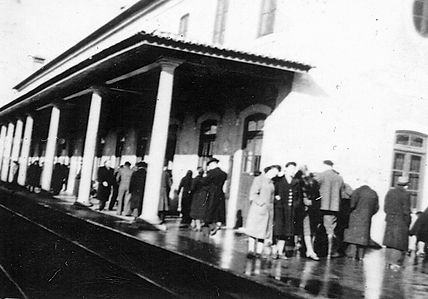top of page

RACHEL WOLF GALLER




1924: born in Rodange (L)
May 1940: evacuated to France; after the French defeat, the Schlang family returns to Esch/Alzette
Dec. 1940: because he is a Jew, Josy Schlang is no longer allowed to work
1941: forced labour in the quarries at Nennig (D)
Aug. 1941: arrested by the Gestapo
Oct. 1941: deported to Litzmannstadt ghetto (PL)
1942-1945: forced labour in various concentration camps, including Auschwitz and Auschwitz-Monowitz
Jan. 1945: death march to Mauthausen concentration camp in Austria, then to Gusen, a Mauthausen subcamp
May 1945: liberation by the Americans in Grieskirchen, return to Luxembourg as the only survivor of his family
59
1938 kamen enorm viele Flüchtlinge aus Deutschland nach Luxemburg und in unseren Lagerräumen wurden Kleider hingelegt und Hygienesachen. Die Flüchtlinge konnten sich dort aussuchen, was sie wollten.
Joseph Schlang, contemporary witness interview (D’Pupille de la Nation erënneren sech), 2003
Work

In Auschwitz, only the Jewish prisoners who were used for forced labour were registered. The other deportees were murdered. Auschwitz-Birkenau 1942

In Auschwitz, only the Jewish prisoners who were used for forced labour were registered. The other deportees were murdered. Auschwitz-Birkenau 1942
Josy Schlang completed a hairdressing apprenticeship at the Esch trade school. He lost his job in late 1940 as a result of the Nazis’ policy towards Jews. In May 1941 the Schlang family was forced to move to Luxembourg City. Schlang and his father Tobias Schlang were deported to the quarries of Nennig for forced labour. Schlang was arrested by the Gestapo in August 1941 for wearing patriotic symbols. For a fortnight, he had to report to Gestapo headquarters in Villa Pauly after work. There he was interrogated and often maltreated. On 16 October 1941 the Schlang family was deported to Litzmannstadt ghetto. Josy Schlang volunteered for work and was separated from his family, who were then deported to Majdanek extermination camp and killed. Josy was sent to various labour camps. In 1943 he was deported to Auschwitz, where he had to work in several sub-camps, including Monowitz and Sosnowitz. In the January 1945 death marches he was forced to march to Mauthausen in Austria and then to Gusen. In May 1945 he was liberated by the Americans. He weighed only 40 kg.
Es war grauenhaft. Es waren ältere Leute, Babys dabei. In unserem Abteil war noch ein älteres Ehepaar aus Wien und der Mann starb in unserem Abteil und wurde dort in Vilar Formoso begraben und nachher habe ich erfahren, dass seine Ehefrau ebenfalls dort gestorben ist und auch da begraben ist. Das rote Kreuz brachte uns jeden Tag Brot und heißen Tee, das wars.
Joseph Schlang, contemporary witness interview (D’Pupille de la Nation erënneren sech), 2003
Meine Eltern hatten eine Kabine und durften in dem Essraum essen, aber meine Schwester und ich nicht. Wir mussten in den, wie sagt man, in den Kellerräumen schlafen, ja. Das war furchtbar, Mäuse, etc. und da schliefen wir auf Deck.
Joseph Schlang, contemporary witness interview (D’Pupille de la Nation erënneren sech), 2003
In Auschwitz, only the Jewish prisoners who were used for forced labour were registered. The other deportees were murdered. Auschwitz-Birkenau 1942

bottom of page
